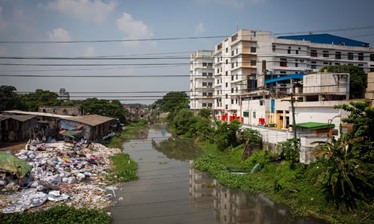
Report Reveals Nearly a Quarter of Major Fashion Brands Lack Decarbonization Plans
DKNY, Tom Ford, and Reebok are among the companies that scored 0% in a Fashion Revolution report ranking the top 250 firms.
Nearly a quarter of the world's largest fashion brands, including Reebok, Tom Ford, and DKNY, do not have a public plan for decarbonization, according to a new report. The fashion industry is notorious for its pollution levels, with some factories releasing hazardous chemicals into nearby waters. The industry is also criticized for generating significant waste, with fast fashion contributing to overconsumption.
The "What Fuels Fashion?" report, published on Thursday, evaluates and ranks 250 of the world's largest fashion brands and retailers—those with a turnover of $400 million (£313 million) or more—based on their public disclosure of climate goals and actions. Researchers assessed 70 different sustainability criteria, including emissions targets, supply chain transparency, and the use of renewable energy in factories, to assign a percentage score to each fashion chain.
Brands like DKNY, Tom Ford, and Reebok received a 0% decarbonization score, indicating they had not adequately outlined plans to eliminate emissions from their supply chains. Other low scorers included Urban Outfitters and Dolce & Gabbana, which each scored 3%.
The top performers in sustainability were Puma (75%), Gucci (74%), and H&M (61%).
Only four out of 250 brands reviewed by Fashion Revolution met the emissions reduction targets set by the United Nations. The report found that just 117 of the 250 brands had any decarbonization targets, and of those, only 105 disclosed updates on their progress. However, 42 of these brands reported increased scope-3 emissions compared to their baseline year.
According to the report, 86% of companies lack a public coal phaseout target, and 94% do not have a public renewable energy target. Less than half (43%) of brands are transparent about their energy sources, whether from coal, gas, or renewables.
The report also highlighted the industry's overproduction problem, with most major fashion brands (89%) not disclosing how many clothes they produce each year. Many of these garments end up in landfills.
Supply chain workers, particularly in major textile-producing countries like Bangladesh, are often on the frontlines of the climate crisis. Severe flooding and extreme weather events such as droughts, heatwaves, and monsoons threaten nearly 1 million jobs in the sector. The report found that only 3% of major fashion brands disclose efforts to financially support workers affected by the climate crisis.
Maeve Galvin, the global policy and campaigns director at Fashion Revolution, said, "By investing at least 2% of their revenue into clean, renewable energy and upskilling and supporting workers, fashion could simultaneously curb the impacts of the climate crisis and reduce poverty and inequality within their supply chains. Climate breakdown is avoidable because we have the solution – and big fashion can certainly afford it."
The underperforming fashion companies mentioned in the report have been contacted for comment.